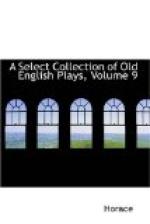[251] Rather Ptolemy.—Pegge.
[252] Latten, as explained by Dr Johnson, is “Brass; a mixture of Copper and Caliminaris stone.” Mr Theobald, from Monsieur Dacier, says, “C’est une espece de cuivre de montagne, comme son nom mesme le temoigne; c’est ce que nous appellons au jourd’huy du leton. It is a sort of mountain copper, as its very name imports, and which we at this time of day call latten.” See Mr Theobald’s note on “The Merry Wives of Windsor,” act i. sc. 1.
Among the Harleian MSS. is a tract, No. 6395, entitled “Merry Passages and Jeasts,” written in the seventeenth century, [printed by Thoms in “Anecdotes and Traditions,” 1839,] in which is the following story of Shakespeare, which seems entitled to as much credit as any of the anecdotes which now pass current about him: “Shake-speare was god-father to one of Ben Jonson’s children, and after the christning, being in a deepe study, Jonson came to cheere him up, and ask’t him why he was so melancholy? No, faith, Ben (sayes he) not I, but I have been considering a great while, what should be the fittest gift for me to bestow upon my god-child, and I have resolv’d at last; I pr’y thee what, says he? I faith, Ben, Ile e’en give him a douzen good Lattin spoones, and thou shall translate them.”
[253] Deft is handy, dexterous. So in “Macbeth,” act iv. sc. 1—
“Thyself and office deftly show.”
See note on “Macbeth,” edit. 1778.—Steevens.
[254] [Concert.]
[255] [Summoners, officers of the old ecclesiastical court.]
[256] [Ignorant of arts.]
[257] A jangler, says Baret, is “a jangling fellowe, a babbling attornie. Rabula, ae, mas. gen. [Greek: Dikologos]_ Vn pledoieur criard, une plaidereau_.”
[258] This speech is in six-line stanzas, and beforn should rhyme to morn, as it does in the old copies, which were here abandoned. —Collier.
[259] i.e., “Going. Gate, in the Northern Dialect, signifies a way; so that agate is at or upon the way.”—Hay’s “Collection of Local Words,” p. 13, edit. 1740.
[260] Here again, as in the passage at p. 354, we have arms for harms. In the old copies this speech of the Herald is printed as prose.—Collier.
[261] A monster feigned to have the head of a lion, the belly of a goat, and the tail of a dragon.
[262] “If at any time in Rolls and Alphabets of Arms you meet with this term, you must not apprehend it to be that fowl which in barbarous Latine they call Bernicla, and more properly (from the Greek) Chenalopex—a creature well known in Scotland, yet rarely used in arms; but an instrument used by farriers to curb and command an unruly horse, and termed Pastomides.”—Gibbons’s “Introductio ad Latinam Blasoniam,” 1682, p. 1.
[The allusion here is to the barnacle of popular folk-lore and superstition, which, from a shell-fish, was transformed into a goose.—See “Popular Antiquities of Great Britain,” iii. 309.]




